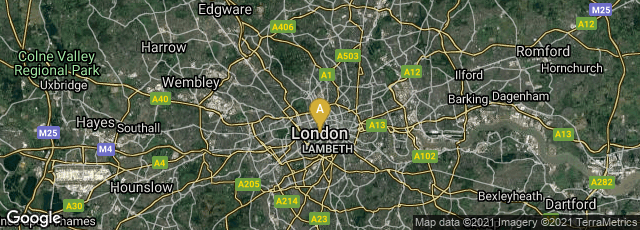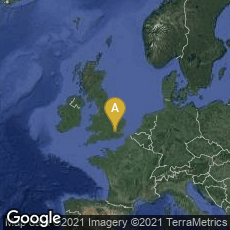

A: London, England, United Kingdom
On January 27, 2016 the artificial intelligence company DeepMind, a division of Google based in London, announced that its AI progam AlphaGo mastered the ancient Chinese game of Go.
"Traditional AI methods—which construct a search tree over all possible positions—don’t have a chance in Go. So when we set out to crack Go, we took a different approach. We built a system, AlphaGo, that combines an advanced tree search with deep neural networks. These neural networks take a description of the Go board as an input and process it through 12 different network layers containing millions of neuron-like connections. One neural network, the “policy network,” selects the next move to play. The other neural network, the “value network,” predicts the winner of the game.
"We trained the neural networks on 30 million moves from games played by human experts, until it could predict the human move 57 percent of the time (the previous record before AlphaGo was 44 percent). But our goal is to beat the best human players, not just mimic them. To do this, AlphaGo learned to discover new strategies for itself, by playing thousands of games between its neural networks, and adjusting the connections using a trial-and-error process known as reinforcement learning. Of course, all of this requires a huge amount of computing power, so we made extensive use of Google Cloud Platform.
"After all that training it was time to put AlphaGo to the test. First, we held a tournament between AlphaGo and the other top programs at the forefront of computer Go. AlphaGo won all but one of its 500 games against these programs. So the next step was to invite the reigning three-time European Go champion Fan Hui—an elite professional player who has devoted his life to Go since the age of 12—to our London office for a challenge match. In a closed-doors match last October, AlphaGo won by 5 games to 0. It was the first time a computer program has ever beaten a professional Go player. You can find out more in our paper, which was published in Nature today....
"We are thrilled to have mastered Go and thus achieved one of the grand challenges of AI. However, the most significant aspect of all this for us is that AlphaGo isn’t just an“expert” system built with hand-crafted rules; instead it uses general machine learning techniques to figure out for itself how to win at Go. While games are the perfect platform for developing and testing AI algorithms quickly and efficiently, ultimately we want to apply these techniques to important real-world problems. Because the methods we’ve used are general-purpose, our hope is that one day they could be extended to help us address some of society’s toughest and most pressing problems, from climate modelling to complex disease analysis. We’re excited to see what we can use this technology to tackle next!. Posted by Demis Hassabis, Google DeepMind" (https://googleblog.blogspot.com/2016/01/alphago-machine-learning-game-go.html, accessed 02-09-2016).